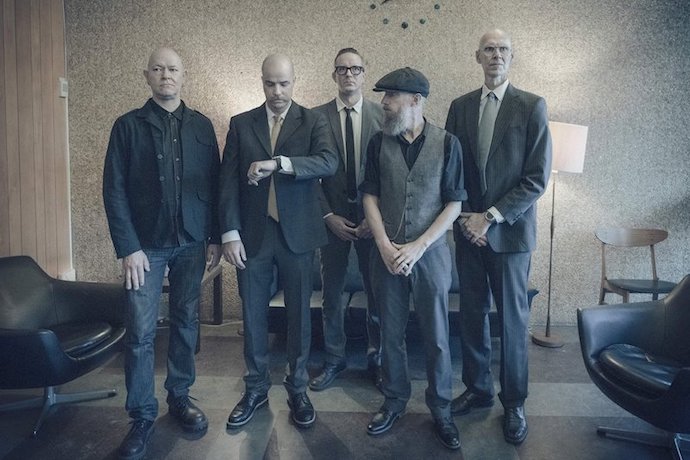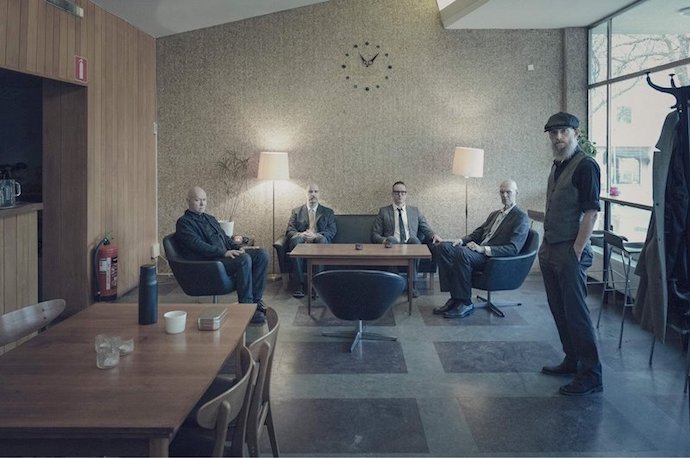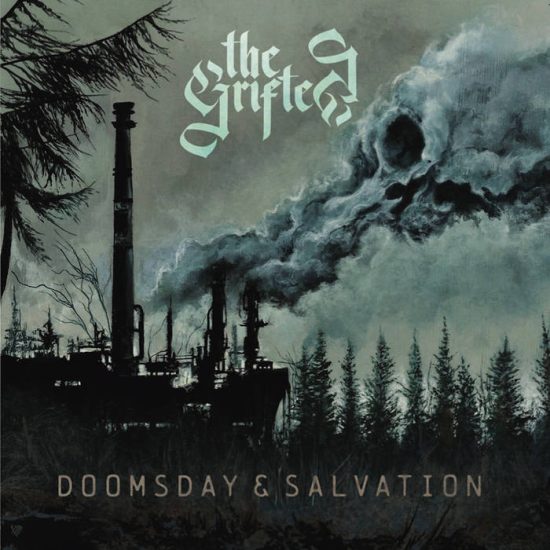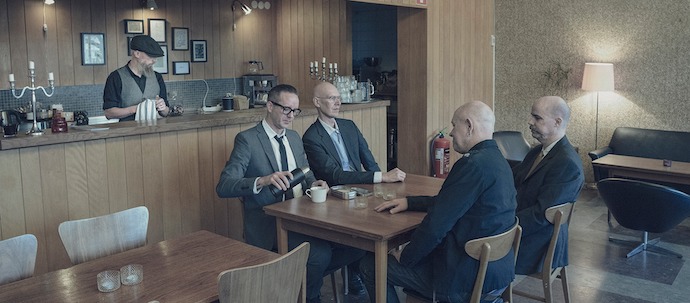
(If you’re a death metal fan and you haven’t yet heard The Grifted‘s new album, released in April by Personal Records, you have some excellent listening ahead of you, and you’ll probably be even more interested after you read Comrade Aleks‘ excellent interview with guitarist Stefan Lagergren.)
NCS’ constant followers will remember The Grifted‘s track premiere in March (here). This absolutely classic sounding death metal band from Stockholm drew our attention not only with the killer single “The Maggots Feast” and their debut album Doomsday & Salvation itself, but also with heir shockingly civilized image, very organic and impressive.
The Grifted was founded in 2020 technically, but it’s the renamed version of the Mr. Death collective which used to record two proper full-lengths works and two EPs in a period from 2007 to 2020. Moreover, Juck Thullberg (bass) and Stefan Lagergren (guitars) were founders of the pre-Tiamat band Treblinka and took part in recording of Tiamat’s debut Sumerian Cry (1990).
And it’s right to note what their colleagues Jonas Ohlsson (drums), Jocke Lindström (vocals), and Staffan Skoglund (guitars) certainly know a few things about how to turn everything upside down and unleash the sheer death metal madness upon our doomed world.
This interview should have been done earlier, and I kept it on my mind for almost four months, so I invite you to join our conversation with Stefan Lagergren with a sense of relief and the feeling that the right thing is done. (And thanks to Nathan Birk, Suspicious Activities PR, for organizing this interview.)
******
Hi The Grifted! How are you? Who’s online today?
Hi, my name is Stefan Lagergren and I play guitar in The Grifted.
Hi Stefan! It’s good to meet you. The Grifted’s first album Doomsday & Salvation was released in April, and I found out that you just played a release party. Are you tired of gigs and don’t find any fun performing your stuff on the stage?
Well, let’s just say that if you were to get in the queue of all the people trying to book us, you wouldn’t have to wait long. With every band trying to recuperate the gigs lost to the pandemic, it’s daunting to get out there for a band who just released their debut album, regardless of history. But we’re working on getting the new name out to relevant parties all around, and we are certainly not tired of being on stage.

How often do people ask why you renamed Mr. Death to The Grifted? What was the reason to start it again under another name?
You’re not the first one to ask, but it used to be the opposite. When we were called Mr. Death people always asked when we would rename our band. That in itself was not the reason, but some time back we realized that all of us in the band privately thought we should change name. And with an album in the works, the first one without our co-founder Alex, we figured it was time.
Was it hard to start it anew again? I guess that Mr. Death had some reputation behind its name.
Not really hard, I’d say. I guess we had some reputation, but we had also been quite secluded for a long time, with sporadic, local gigs and no new releases. With thousands of death metal bands releasing stuff each month, we figured that we were not top-of-mind for that many people, so we took the chance to semi-reinvent ourselves. With that said, Doomsday & Salvation was written and mainly recorded as Mr. Death, so if we got the new name out there, the Mr. Death fans would hopefully follow.
What does differentiate The Grifted from those “thousands of death metal bands”?
The Grifted might be a new band, but we are a bunch of people who have played death metal since the late eighties and stayed underground. We’re not a retro band, and we don’t try to emulate an era. We just continue what we’ve always done.
Do people ask you about another Treblinka reunion? Do you get offers from booking agencies to perform some shows as it was in 2008? And aren’t you tired of all these Treblinka-related questions?
You are clearly over-estimating the amount of interviews I do, but no I’m not really tired of Treblinka questions. I am still a bit taken aback with the impact that band seem to have had, especially considering that we were around for just a couple of years. To my knowledge, we have had just one or two booking questions for a Treblinka reunion, and those were many years ago. I’d like to think that we never really reunited, though, and the 2008 gig was a tribute thing, considering that Hellslaughter wasn’t there.
Obviously, there have been reunions with much fewer original members than we had, but I know that we will never have a full original lineup, so I don’t see such a thing ever happening again. Today it’s like every band that have ever existed are reunited and out touring. Treblinka will not be one of those.
All The Grifted’s members are experienced musicians and you alongside Jörgen Thullberg are true veterans of the death metal scene. How do you share your duties in the band? Do you have a main composer, lyrics-writer, and PR-guy?
We are very democratic, with no established “band leader”. Everybody contributes, with riffs, arrangements, ideas, lyrics, designs, PR and everything. Not an equal amount of everything, ibut whatever we feel comfortable with.

The Doomsday & Salvation artwork and the title look like you are focusing on environmental problems, the negative effects of industrialization, etc. I don’t like such blunt questions as that, and Jocke’s manner of singing is exceptional, but it’s hard to understand a word. What kind of message do you put into The Grifted songs? Does it fit the artwork’s idea?
We wanted the artwork to be bleak and ominous, but without the demons and corpses and coffins and the usual staples. A bit more current, if you will. It’s actually not to convey a message or to present our stance in any way, as we mostly carry ourselves in the realms of fiction. Privately, I am pretty sure we all have our convictions, but as a band we stay clear of commenting on current topics.
Your promo photos and video are absolutely impressive. How did you come to the decision to use this “civilized” image? It’s a pretty witty, remarkable move.
Previously we had this image of zombies, with dirty, torn suits and blood and dirt in our faces. That was something we truly got sick of. It was a real mess to clean up after a gig, and the suits started to give life to all sorts of flora. That had to go, but we really didn’t want to go all “jeans and t-shirts”, so this idea came up. Still with the suits, but a bit cleaner from now on. It raises some eyebrows, and the image of us might stick a minute longer in people’s minds. The photos, and the related one-take video we made for “The Maggots Feast”, seem to be working well for us.
They do indeed! Don’t you feel yourself tired from all necessary death metal image trends after playing it for 35 years?
You might have seen the promo photos we had for Treblinka, where me and Najse had regular jeans and t-shirts, and Juck and Hellslaughter were decked out in corpsepaint and chains and nails and everything. Clearly, I wasn’t into that kind of stuff even back then. These days I have no interest in what’s considered “true” or not, and don’t care. You can’t really say anything negative about a band in black jeans and Carnage t-shirts, though. It’s a good look. It’s just not for The Grifted.

In which conditions did you record the album? Did you have a few intense sessions or did you record the songs just when you had free time for that?
We had several intense sessions, very long apart. It was a real mess. We started in Sunlight Studio, and had a pretty good few days, but then the schedule broke down totally, and at the next session, months later, there were technical issues. In the end, what we had was unusable. We had to re-record the drums at another studio; the guitars and some vocals were re-recorded. We had to compile material, from all these places and sessions, to go to yet another studio to have it mixed. It took us over five years, from start to finish. A global pandemic in the middle of everything didn’t really speed things up, either.
Sunlight is one of the key studios in the world of metal. I can’t say that I searched really carefully, but it seems you recorded only one of Mr. Death’s album there. Why did you ignore it?
We recorded everything, except the second album, at Sunlight with Mr. Death. So, two EPs, a single, and an album. Me and Jörgen were there loads of times in the old days, so we know Tomas Skogsberg very well. But when it comes to longer projects, like an album, we haven’t had the best of luck with Sunlight. I don’t know, maybe we demand too much from such a small studio.
What were your requirements for the sound when you started to record Doomsday & Salvation? Did you get the result you aimed to?
The recording was a wreck of such magnitude that we are astounded that it actually came together, sounding really good. We set out to have a sound that was death metal, but have it sound like it came from a room rather than from a Pro-Tools session. A bit dirtier and more natural, for lack of a better term. At one stage we kept lots of noise and feedback all over the record, which was pretty cool, but got annoying really quick.
How did you get in touch with Jacobo Córdova’s Personal Records? Is it a comfortable collaboration?
We sent out a “preview” with three songs to a handful of labels, and Jacobo was the one who reached out. The only doubt we had was that the timezone difference would make communication between us in Sweden and Personal Records in Mexico really slow, but Jacobo knows what he’s doing so there are no such emergencies to sort out.
A new album of Grand Cadaver, another death metal band where you play, will be released in August. Do you feel yourself comfortable playing in two bands at the same time? How do you see the core differences between The Grifted and Grand Cadaver?
Yes, I really like playing in both bands. The core difference between them is the time spent, I’d say. The Grifted rehearses every week, and we work on songs together in the rehearsal place. Grand Cadaver have rehearsed three times total, and that’s to get warmed up for a bigger gig or a tour. Both bands are very collaborative, but the The Grifted is a continuous process, and Grand Cadaver is concentrated to a few weeks per year. One distinction between the bands is that Grand Cadaver have some really high-profile members, which both opens some doors and at the same time sets a strict limit to what we can do, with their packed schedules.
What are you plans for the rest of 2023?
Doomsday & Salvation is out, so we’re spreading the word, and since the album took such a long time getting out, we already are well on our way to having material for another album. We are also itching to play more gigs, so that will be our main focus for the time being.
What motivates you to spread the word further and promote the band?
I recently heard of a Swedish band that have been around since 1988, but they have never played a gig or recorded anything. They still meet a couple of times a month and rehearse and write songs. That’s a very impressive way to stay underground. We are a bit more sell-out than that, since we want others to hear us. We think we are a good band, and we want more people to also think that. Nothing more than that.
Thank you for the interview Stefan! And good luck with supporting The Grifted, I guess that this interview may help a bit.
Thank you very much.
https://www.facebook.com/thegrifted
https://personal-records.bandcamp.com/album/doomsday-salvation
